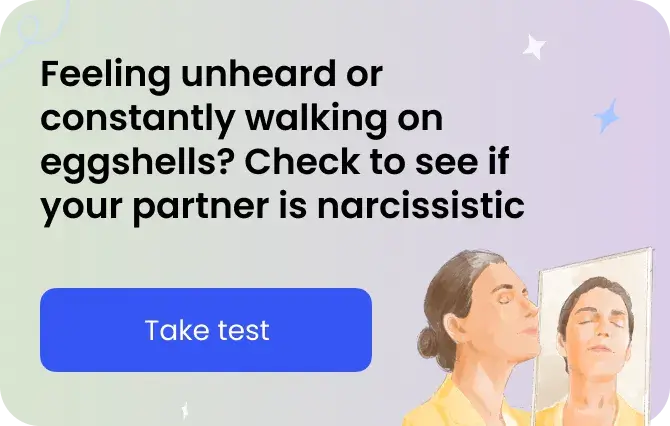Things don’t work anymore. You think you need to part your separate ways, grow as an independent person, and find happiness on your own. The fact that you’re already together seems like the only reason you keep holding on, but deep down, you know it’s time to let go.
How to break up with someone you love? How to break up with someone who no longer feels close to you? We’ll answer both of these questions in the article. Keep reading to discover the tips that can help you navigate this difficult but necessary process with care and respect.
But first, could you deal with a narcissistic partner? Take our quick quiz to uncover the signs and get clarity before making your next move.
Why do people break up?
85% of people experience at least one breakup in their lifetime. [1] While there’s nothing wrong with two people deciding to go on different paths, it still can feel really painful. This list can help you better understand why you want to leave your current partner and confirm that your feelings are valid.
1. Love turns into a habit
When you fall in love, your body produces heightened levels of oxytocin and dopamine, known as “happy hormones,” and reduces the level of cortisol (“stress hormone”). [2] This is commonly known as the ‘honeymoon phase.’ As such, you feel constantly excited, energized, and deeply connected. But then, over some time, your brain adapts, and hormone levels stabilize. Many people might approach it as “the death of love and passion.”
Think about the feeling of a spark that was in the beginning. You were going on constant dates and kissing every time possible. But then… something changed. You no longer appreciate your significant other as the love of your life but rather as a part of the family, a close friend, or even a neighbor.
Though, those who continue to put an effort into their relationship manage to rekindle the spark and deepen their connection in new ways. On the other hand, those who stop putting in effort may drift apart, as the initial excitement fades into routine.
2. Different views on important things, such as money, children, or further life
Of course, feelings are super-important. Yet, to build a strong bond, both of you need to have similar views on core things. If you dream about a big family and your significant other has no desire to have children, it seems like things won’t work out in the long term. Similarly, if you have an idea to move to Asia over a few years and your partner dreams of a career in Paris, it’s clear that your paths might not align.
Some differences can always be managed and discussed. Still, fundamental things can be difficult to compromise on, so at some point, they can lead to ongoing resentment- or a breakup.
3. Cheating
Around 20% of men and 13% of women report having intimate relationships with someone other than their significant other while being married. In reality, this percentage might be even higher, as many people may not admit to infidelity. While some relationships survive after the fact of cheating, a lot of couples might break up. The aftermath of cheating may cause a loss of trust, and even if the relationship continues, it might never feel the same again.
4. Lack of trust
This point might stem from cheating, but it can also be an individual reason why people decide to respectfully cut the contact. Maybe you can’t share your dreams, wishes, and desires with a loved one. Or, maybe, you don’t trust them in terms of money, commitment ,or plans for life. Trust is rather crucial and when it is broken, even small doubts can grow over time, making it hard to feel secure.
5. Constant fights and lack of respect
All couples may fight sometimes, but the essence is how you fight and how you resolve conflict. If your discussions lead to relationship development, you hear each other, realize what problems you have, and how to fix them, this can actually strengthen your bond. If even small disagreements escalate into dramatic fights and you constantly blame or criticize each other, this can feel overwhelming and can lead to a breakup.
6. Huge value and personality differences
Maybe you’re just different. In terms of values, hobbies, spending time, sexual temperaments, or the way you handle emotions and conflict. Of course, two people shouldn’t be as alike as two peas in a pod, and some great qualities of each one will empower your couple.
If you feel like you are from two separate worlds and simply can’t find common ground, it can create distance. Some couples ignore these incompatibilities when starting dating, while others grow in different directions over time. Either way, unresolved differences may lead to constant misunderstandings.
5 tips on how to break up with someone without hurting them
Have you ever heard of FOMO (fear of missing out), which actually means a worried feeling that you may miss exciting events that other people are going to? [3] In fact, there’s one more term that sounds a bit similar — FOBU (fear of breaking up). This is an unofficial term that describes a feeling of anxiety about ending a relationship, followed by thoughts, “I will never find anyone better.”
While both FOMO and FOBU can feel overwhelming, doing something (or staying with someone) just because of fear isn’t the best idea. So, we’ve collected a few tips on how to break up with someone if you don’t feel good together anymore.
1. Understand why you want to break up
First and foremost, you need to understand that you’re making the right decision. Around 40–50% of couples who break up end up getting back together at some point. [4] Of course, some of them may do it in years or even decades, but some get back to an ex after making a rash decision.
Consider spending time reflecting on why a clean break matters to you. Think about the possible problems associated with keeping things open-ended. For some people these steps may help avoid feeling guilty afterwards or questioning their decision.
Think about the reasons that make you consider a breakup
Maybe it isn’t the time to consider a breakup conversation, and the only thing you need is your own space, more care, and attention. It’s better not to wait for a partner to change without even saying what you truly need. Open communication can sometimes solve issues that seem like deal-breakers.
Otherwise, if things really go wrong, you feel sad and no longer want to stay in this relationship, list your “whys.” In this case, you’ll have a clearer picture of what makes you unhappy and whether these issues are temporary and fixable.
Discuss your problems together
Healthy communication in long-term couple relationships is the basis on which expectations, trust, and equality are created. [5] Difficult times aren’t exceptions, and all problems require a sincere talk and the willingness to be vulnerable with one another.
Explain what’s going wrong for you and listen to your partner in this matter. You need to discern which compromises may be acceptable and which problems might be completely incompatible. Such honest conversation can help you both understand each other’s feelings and needs and even avoid a breakup.
Take a moment to analyze the whole situation
If nothing changes, and you understand that things no longer work, you might need to accept that a breakup doesn’t make you a bad person. Though you may need to choose the right time for it. For instance, if you share kids or a pet or have shared responsibilities, consider the context and timing of how you navigate this conversation. Planning ahead can make things easier.
Talk to a trusted friend
Finally, if all this stuff feels overwhelming, you can always reach out for support. There’s nothing wrong with sharing your emotions, but not intimate things from inside the relationship, with friends. However, it’s crucial to select the appropriate moment for this decision. Listen when you need it most.
2. Get ready for a breakup conversation
Once you realize that the relationship is over, there’s no sense in forcing contact. So, you need to plan a conversation considering what you and another person feel.
- Deadline. 7% of marriages that keep staying together are chronically unhappy. [6] Of course, you might not want to be “a bad guy” and initiate a breakup, but having a deadline for it can help you avoid the trap of “I’ll stay with them a little longer even though nothing changes.”
- Place. It’s better not to do it over a text message or phone call. Choose a location that will let you talk without pressure. It’s better not to meet at anyone’s place because it can make the breakup more emotional and harder to walk away from. A neutral, quiet place — like a park or a calm cafe — can help keep the conversation respectful.
- Time. When you break up with someone, choose a time when you’re not exhausted or stressed. It’s better to avoid moments when you or your partner is dealing with major life challenges, like exams, work deadlines, or family issues. Also, it’s better not to leave your significant other on their birthday or any other holiday.

3. Try to anticipate your partner’s reactions
Your future ex might ask a lot of questions, and it’s better to answer them if you want to be honest and take care of their feelings. You might need to think about the following:
- What is the main reason behind your breaking up with them?
- Why don’t you believe that these relationships can get better or work long-term?
- Do you feel like you’ve already tried everything to fix the problems? If so, what have you tried, and why didn’t it help?
- Do you feel unhappy because of their actions, your feelings, or both?
- Is there anything they could say or do that would change your mind?
- Will you agree to stay together if they promise to change? If yes, what changes do you expect, and what is the deadline?
4. Stay empathetic
Experiencing a breakup significantly decreases life satisfaction for a certain period and brings a lot of stress to a person’s life. [7] As such, if you care what a person feels and don’t want them to feel worse and worse over a conversation, it’s better to keep an honest yet gentle approach.
Don’t be too vague or sugarcoat, but also avoid too much detail
Your partner might seek an explanation of why you’ve made such a decision, so it’s better to give a clear answer. Still, it doesn’t mean that you need to go into detail and remember every painful moment and scandal that hurt you. On the other hand, there’s no sense in downplaying your feelings or avoiding the truth, as if everything were OK, you wouldn’t break up.
Respect your partner and be honest
Feeling confused, sad, and scared is typical for most people when a relationship ends. [8] For you both to maintain dignity and move on more peacefully, it may be helpful to stay calm and follow such advice:
- Acknowledge your and your partner’s emotions, and show understanding as they process what they’re experiencing.
- Be clear about your decision, but avoid blaming them or making harsh statements.
- Focus on how you feel and why this is the right choice for you. Use “I” statements to convey your own needs and feelings.
Avoid giving mixed signals or false hope
Leaving things open-ended is one of the worst things you can do after a breakup. If you aren’t going to stay friends with your ex and, even more, get back together, make sure to clearly communicate that.
60% of married people agree that their ex is on their mind too often. [9] It can definitely stem from inner reasons and lasting feelings, but if you leave things unclear, it can make it harder for both of you to heal and move on.
5. Think about the future
Finally, when you break up with someone, it’s vital to clarify what you plan to do next. If you live together, discuss with your ex-partner who and when you will move away. If you work together, make a clear plan on how to handle it, too. What’s more, it’s better to answer the following question:
- How will you handle mutual friends after the breakup?
- Who will keep the shared belongings, and how will you divide them?
- How will you handle social events that you both might attend?
- If you have joint finances, how will you manage or separate them?
- Will you share any details with friends or keep the breakup private?
- Do you expect to stay in touch, or do you prefer no contact?
We asked Nicole Arzt, LMFT, what other things should be discussed on the spot. “Keep in mind that some breakups are not one-time conversations. For example, if you share assets- like a home or children or even shared items- you will need time to reflect and reassess what both of you need. Make it a point to plan when you two can come together to hash out details at a later time.”
Why is it hard to break up?
Well, this happened, and you’re no longer together. When your lifestyle changes so dramatically, it’s OK to feel lost. Here are some tips that might help you recover.
Emotional attachment
Close relationships can be viewed as a protective factor for long-term emotional stability and emotional well-being. [10] Simply put, when we form deep emotional connections, we become attached to the person and the comfort they provide. This attachment makes it harder to imagine life without them, even if the relationship is no longer fulfilling. It can take time for this attachment to change or reduce in intensity.
Fear of loneliness
Studies prove that 17% of people between 18 and 24 years old and 25 and 35 years old said they felt alone quite often. [11] At the same time, staying in a relationship creates a feeling that everything is fine, even though the connection may be quite painful. Sometimes it feels more comforting to be in a relationship, even when it’s lonely, than to be single and alone.
False hope
“One day, they will change.” You might not see any progress in conflict resolution, but still believe that your partner will eventually realize their mistakes and things will improve. You may also be in love with someone’s potential. Holding onto this belief can make it harder to face the reality that things may never be different.
Comfort in familiarity
How to break up with someone you live with? Answering this question may be even more challenging. If you live with a partner, have a common business, or share finances, the thought of change can feel overwhelming. “Well, our relationship isn’t perfect, but I’ll need to change my whole lifestyle if we break up.” Such thoughts can make it seem easier to stay together, even if it’s not fulfilling.
Social pressure
You may worry about others’ opinions, your parents’ reactions, and even the fact that your social circle might judge you. The fear of facing awkward questions can make you stay together with a person even if the relationship brings pain and makes you feel frustrated.
What to do after the breakup
Well, this happened, and you’re no longer together. But… What’s next? When your lifestyle changes so dramatically, it’s OK to feel lost. Yet, here are some tips that might help you recover.
1. Don’t get in touch too early
If you don’t have shared responsibilities and decide to cut the contract, it’s better to stick to this decision, at least for some time. You might believe that you’ll build a strong friendship or support each other. Still, in reality, both you and your ex may need some emotional and physical space to process emotions and heal without the pressure of maintaining a connection.
It doesn’t mean that you’ll never be allowed to communicate. Yet, it’s better to wait until things stop being so painful. If contact must happen, keep it neutral and on topic.
2. Allow yourself to grieve
Feeling frustrated is normal, as breakup grief is common among both initiators and those who were left. [12] The best thing you can do is to let yourself experience this pain. Try journaling and gratitude tracking in the Breeze app, talking to close ones, or meditating. Accepting emotions for what they are- without trying to judge them- will help you heal and move forward.
3. Practice self-care
Studies prove that some people experience post-traumatic growth after a breakup [13] because they approach self-improvement and goal-reaching as coping strategies. Also, this can be an effective approach that helps shift your focus from the pain of the breakup to positive actions.
For instance, you can build new nurturing habits with Breeze. Try simple routines that send you regular reminders on your goals and help keep track of your progress.
4. Take care of your mental health
If nothing happens and you stay sad and overwhelmed for too long, it may be necessary to reach out to a mental health professional. Every person needs someone to listen to, share their worries with, and discuss hurtful moments without judgment. A licensed therapist can provide a safe space to express your emotions.
5. Avoid jumping into a new relationship too soon
Yeah, lots of us know how it happens. You still process breakup grief and think about your ex, but feel so lonely that you might rush into a new relationship for comfort. However, it isn’t respectful of your new partner. Moreover, this can prevent you from fully healing and learning from past experiences. Poor rebounds can lead to more emotional pain and heartache.
Thus, it’s important to take time for yourself, understand your needs, and regain emotional stability. Once you have healed and gained clarity, you’ll be in a better place to build a healthy, fulfilling relationship.
FAQ
What to say when you don’t want to continue a relationship anymore?
Nicole Arzt, LMFT, answers, “In general, it’s best to be straightforward and neutral. You might say, “We’re growing apart, and I no longer want to be in this relationship.” Or, you could say, “I’ve given this a lot of thought and no longer see us as compatible. I’m very sorry.” You don’t control whether the relationship ends on a positive note — your partner has a right to their feelings — but you can control being civil and respectable in your delivery.”
What are the 5 stages of a breakup?
There’s no scientifically proven theory that perfectly describes how everyone handles the end of a relationship. Still, a lot of people experience 5 stages of grief when going through a breakup. It’s based on Kubler-Ross’s theory that initially explained handling the death of a loved one but later applied to other forms of grief, including grief after breaking up. [14]
- Denial
- Anger
- Bargaining
- Depression and detachment
- Acceptance
How to break up with a very nice person?
No matter how great your significant other is, you may decide to continue on your own, and makling this change doesn’t make you bad or egoistic. Remember to approach your partner with respect and kindness, acknowledge their worth, and explain that the decision is about your personal needs and growth, not a reflection of their value as a person.
Sources
- National Library of Medicine. “Romantic Relationship Dissolution, Microbiota, and Fibers”
- Harvard Medical School. “Love and the Brain”
- Cambridge Dictionary. “FOMO”
- Medium. “Do Couples Get Back Together After a Bad Breakup (What Percentage of Couples Get Back Together After a Breakup?)”
- Frontiers in Sociology. “Conversations in couple relationships: a trustful foundation when making future parenthood “real”
- Martyn Newman PhD. “Unhappy Marriages and Unhappy Work Teams – Avoiding The Four Mistakes That Lead to Both”
- National Library of Medicine. “Breaking Up is Hard to do: The Impact of Unmarried Relationship Dissolution on Mental Health and Life Satisfaction”
- Evolutionary Psychology. “Breaking up Romantic Relationships: Costs Experienced and Coping Strategies Deployed”
- Medium. “Why 90% of Relationships Fail”
- National Library of Medicine. “Exploring the Association between Attachment Style, Psychological Well-Being, and Relationship Status in Young Adults and Adults—A Cross-Sectional Study”
- National Library of Medicine. “Fear of Loneliness: Development and Validation of a Brief Scale”
- Research Gate. “Breakup Grief – The Difference between Initiator and Non-Initiator Depending on Coping Strategies and Attachment”
- SOCIAL SCIENCES & HUMANITIES. “The Break-up Experience of Romantic Relationship and Post-traumatic Growth Among Vicenarian Adults”
- National Library of Medicine. “Kubler-Ross Stages of Dying and Subsequent Models of Grief”
Disclaimer
This article is for general informative and self-discovery purposes only. It should not replace expert guidance from professionals.
Any action you take in response to the information in this article, whether directly or indirectly, is solely your responsibility and is done at your own risk. Breeze content team and its mental health experts disclaim any liability, loss, or risk, personal, professional, or otherwise, which may result from the use and/or application of any content.
Always consult your doctor or other certified health practitioner with any medical questions or concerns
Breeze articles exclusively cite trusted sources, such as academic research institutions and medical associations, including research and studies from PubMed, ResearchGate, or similar databases. Examine our subject-matter editors and editorial process to see how we verify facts and maintain the accuracy, reliability, and trustworthiness of our material.
Was this article helpful?








